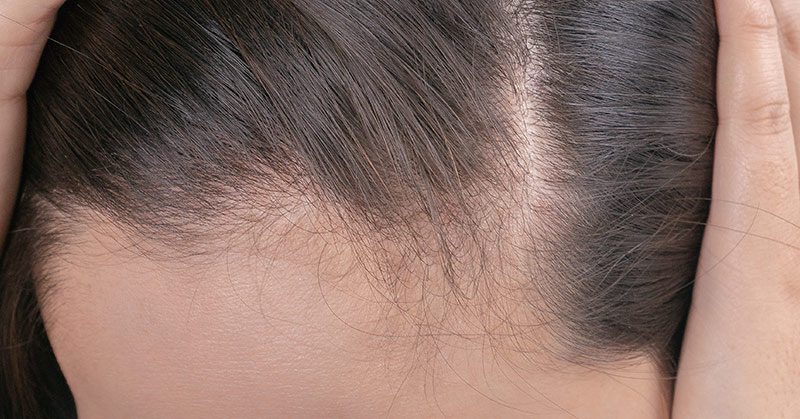It doesn’t matter what gender you are, everyone wants the hair they’ve been dreaming of. Unfortunately, people of all ages and genders experience hair loss, which can be frustrating, devastating, and embarrassing for some people.
Whether you’re new to thinning or balding hair or have been looking for that perfect natural remedy for a while, it’s understandable that you’d want a way to naturally regrow your hair for luscious locks.
However, like most things that are worth doing, natural hair growth doesn’t happen overnight, and it’s essential to take into account that everyone’s underlying cause for hair loss can be different. There’s no magic pill that can make your hair loss go away, or regenerate hair growth instantly—it’s really about finding what works for you and going from there.
So let’s talk about some of the most common causes of hair loss for both men and women, and get into some natural remedies that people who have experienced hair loss have found helpful!
Causes of Hair Loss in Both Men and Women
There are multiple conditions that can cause hair loss—everything from iron deficiency to thyroid conditions.
What are some specific reasons men may lose their hair?
- Diet. A diet that’s deficient in certain nutrients such as protein or iron could cause hair to become thinner [1].
- Medication. Certain drugs used to treat arthritis, high blood pressure, cancer, heart problems, and even depression could cause hair loss [2].
- Stress. Physical or emotional stress can cause hair loss, as can a traumatic incident.
- Health conditions. Sudden hair loss could be related to alopecia areata, which is an autoimmune disorder in which your body attacks your hair follicles, causing your hair to fall out. It usually happens in childhood, and may resolve itself, but hair loss can reoccur [3].
What about the causes of hair loss for women?
- Genetics. This goes for men too, but having a family history of hair loss or thinning could mean you’re more likely to develop the issue [4].
- Stress. Again, this goes for both men and women. Stress could be emotional or physical stress, as your body could have nutritional deficiency or an illness that you could be unaware of—testing from your doctor is the best way to find out what’s going on [5]!
- Hormone imbalance. Time to get some bloodwork done: hormone imbalances can influence hair quality and growth, and women’s hormones can be impacted by taking oral birth control, pregnancy, and even menopause [6].
- Iron deficiency. Iron plays an essential role in your hair health! You could also have another deficiency, such as vitamin B12 deficiency, which can be determined through a blood test [7].
- Thyroid problems. An overactive or underactive thyroid can affect hair growth, and addressing this underlying cause may help you to remedy thinning or balding hair [8].
So Can You Actually Regrow Hair?
It really depends on what’s causing your hair loss, and can vary on an individual basis. For some people, it may certainly be possible to reverse hair loss. For others, it may not be.
For people who have male pattern baldness—a condition related to genetics and hormones in which the hair begins to recede at the hairline and at the crown of your head—you may or may not be successful at remedying hair loss. While male pattern baldness can be slowed or reversed in some instances, once the hair follicles get small enough, as they do overtime in male pattern baldness, they’re unlikely to regrow new hair [9].
However, just because it’s unlikely that hair will regrow doesn’t mean it’s impossible. Of course, correcting the underlying condition of your hair loss can help people who may have a deficiency or need to make certain lifestyle or diet changes to improve their hair growth.
Top 7 Ways to Regrow and Support Hair Growth
Here are the top seven ways you can help support healthy hair growth and begin growing back your hair!
1.Get Enough Protein
Your hair is—surprise—made of protein, namely a specific protein called keratin. Consuming enough protein is a key component of proper hair growth. Whether you eat a plant-based diet with the occasional animal product or are totally vegan, it’s certainly possible to get enough protein to support your hair growth!
2. Exercise
Move! Exercise improves blood flow, removes toxins, and supports overall health, including better-looking hair. If you haven’t yet incorporated regular exercise into your routine, the time to do so is now!
3. Scalp Massage
Try a scalp massage using your fingers or a tool and massage your entire head for about 10-20 minutes every day. Massaging your scalp can help remove toxins, improve circulation, and reduce inflammation. Research shows a manual massage is a simple way to improve hair growth [10]!
4.Supplements
Some tentative research shows that keratin supplements can improve the quality of hair, but not necessarily the growth [11]. Biotin, a B vitamin, has been shown to help improve hair growth when used as a supplement [12].
Other vitamins and supplements may help as well, including:
- Vitamin C may support collagen production, which some people have found helpful [13]. Others have found results by taking collagen supplements as well.
- Omega-3 and omega-6 supplements may help thicken hair and reduce hair loss, according to research [14].
- Zinc deficiency may also play a role in hair loss, and you may consider supplementation under the guidance of your healthcare professional [15].
5. Oils
There are certain oils that may influence hair growth, although they may not work for everyone, depending on what’s causing your hair loss. Applied topically, peppermint oil has been shown to improve hair growth [16]. In other research, rosemary oil worked as well as the medication Minoxidil for hair loss [17].
Essential oils such as these should always be used diluted in a carrier oil such as avocado, coconut, or jojoba oil for best results.
6. Herbs
Some people have reported success with using specific herbs for hair growth, including gingko, ginseng, aloe vera, stinging nettle, and saw palmetto. How you use these herbs and in what concentration will need to be determined by you and your experienced herbalist!
7. Foods
Diet can be hugely influential in supporting healthy hair growth, especially nutrient-dense foods that pack plenty of vitamins, minerals, fatty acids, and proteins. Some of the best foods for hair growth include:
- Eggs
- Spinach
- Wild-caught fish
- Berries
- Avocado
- Nuts and seeds
What Not to Do
Generally, you’ll need to find several things that work in combination with each other, rather than trying just one remedy on its own. When done together, some of these tips have the potential to significantly boost hair growth!
Ingredients to avoid when looking for remedies for natural hair growth include sulfates, parabens, and synthetic fragrances, which can irritate the scalp. These are often seen as the word “fragrance” or “parfum”, and can include any number of nearly 4,000 chemicals that are covered under this term [18].
Conclusion
Diet and lifestyle can go a long way towards supporting hair growth, depending on what’s causing your condition. If you have any underlying issues that could be causing your hair loss, they need to be addressed first for the best results!
If you’re ok with less hair, then don’t worry! I myself have a shaved head and haven’t had “hair” in the conventional sense for over 12 years. It’s really about how you are at your most happiest and healthiest!
Sources
- https://www.ncbi.nlm.nih.gov/pmc/articles/PMC5315033/
- https://www.americanhairloss.org/drug_induced_hair_loss/
- https://www.naaf.org/alopecia-areata
- https://www.health.harvard.edu/staying-healthy/treating-female-pattern-hair-loss
- https://www.ahlc.org/female-hair-loss/
- https://www.americanhairloss.org/women_hair_loss/causes_of_hair_loss.html
- https://www.researchgate.net/publication/233536552_Nutrition_and_Hair_Deficiencies_and_Supplements
- https://www.btf-thyroid.org/hair-loss-and-thyroid-disorders
- https://medlineplus.gov/ency/article/001177.htm
- https://www.ncbi.nlm.nih.gov/pmc/articles/PMC4740347/
- https://www.ncbi.nlm.nih.gov/pmc/articles/PMC3621039/
- https://www.hindawi.com/journals/drp/2015/841570/
- https://www.ncbi.nlm.nih.gov/pmc/articles/PMC6380979/
- https://www.ncbi.nlm.nih.gov/pubmed/25573272
- https://www.ncbi.nlm.nih.gov/pubmed/24371385
- https://www.ncbi.nlm.nih.gov/pmc/articles/PMC4289931/
- https://www.ncbi.nlm.nih.gov/pubmed/25842469
- https://theheartysoul.com/why-fragrance-is-the-new-secondhand-smoke/

